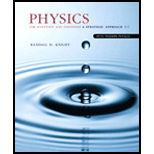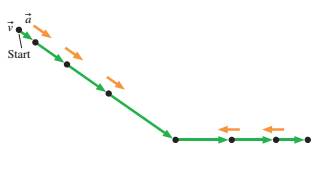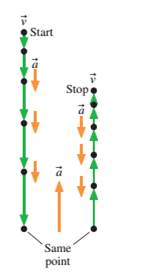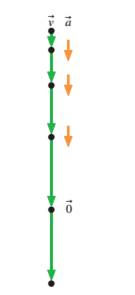
Physics for Scientists and Engineers: A Strategic Approach with Modern Physics (4th Edition)
4th Edition
ISBN: 9780133942651
Author: Randall D. Knight (Professor Emeritus)
Publisher: PEARSON
expand_more
expand_more
format_list_bulleted
Concept explainers
Textbook Question
Chapter 1, Problem 44EAP
Problems 44 through 48 show a motion diagram. For each of these Problems, write a one or two sentence “story” about a real object that has this motion diagram. Your stories should talk about people or objects by name and say what they are doing. Problems 34 through 43 are examples of motion short stories.
44.
FIGURE P1.44

45.
FIGURE P1.45

46.
FIGURE P1.46

47.
FIGURE P1.47

48.
FIGURE P1.48

Expert Solution & Answer
Want to see the full answer?
Check out a sample textbook solution
Students have asked these similar questions
Thor flies by spinning his hammer really fast from a leather strap at the end of the handle, letting go, then grabbing it and having it pull him. If Thor wants to reach escape velocity (velocity needed to leave Earth’s atmosphere), he will need the linear velocity of the center of mass of the hammer to be 11,200 m/s. Thor's escape velocity is 33532.9 rad/s, the angular velocity is 8055.5 rad/s^2. While the hammer is spinning at its maximum speed what impossibly large tension does the leather strap, which the hammer is spinning by, exert when the hammer is at its lowest point? the hammer has a total mass of 20.0kg.
If the room’s radius is 16.2 m, at what minimum linear speed does Quicksilver need to run to stay on the walls without sliding down? Assume the coefficient of friction between Quicksilver and the wall is 0.236.
In the comics Thor flies by spinning his hammer really fast from a leather strap at the end of the handle, letting go, then grabbing it and having it pull him. If Thor wants to reach escape velocity (velocity needed to leave Earth’s atmosphere), he will need the linear velocity of the center of mass of the hammer to be 11,200 m/s. A) If the distance from the end of the strap to the center of the hammer is 0.334 m, what angular velocity does Thor need to spin his hammer at to reach escape velocity? b) If the hammer starts from rest what angular acceleration does Thor need to reach that angular velocity in 4.16 s? c) While the hammer is spinning at its maximum speed what impossibly large tension does the leather strap, which the hammer is spinning by, exert when the hammer is at its lowest point? The hammer has a total mass of 20.0kg.
Chapter 1 Solutions
Physics for Scientists and Engineers: A Strategic Approach with Modern Physics (4th Edition)
Ch. 1 - How many significant figures does each of the...Ch. 1 - How many significant figures does each of the...Ch. 1 - Is the particle in FIGURE Q1.3 speeding up?...Ch. 1 - Does the object represented in FIGURE Q1.4 have a...Ch. 1 - Does the object represented in FIGURE Q1.5 have a...Ch. 1 - Determine the signs (positive, negative, or zero)...Ch. 1 - Determine the signs (positive, negative, or zero)...Ch. 1 - Determine the signs (positive, negative, or zero)...Ch. 1 - A car skids to a halt to avoid hitting an object...Ch. 1 - Prob. 2EAP
Ch. 1 - You are watching a jet ski race. A racer speeds up...Ch. 1 - a. Write a paragraph describing the particle...Ch. 1 - You drop a soccer ball from your third-story...Ch. 1 - A baseball player starts running to the left to...Ch. 1 - A softball player slides into second base. Use the...Ch. 1 - a. FIGURE EX1.8 shows the first three points of a...Ch. 1 - FIGURE EX1.9 shows five points of a motion...Ch. 1 - FIGURE EX1.10 shows two dots of a motion diagram...Ch. 1 - FIGURE EX1.11 shows two dots of a motion diagram...Ch. 1 - A speed skater accelerates from rest and then...Ch. 1 - A car travels to the left at a steady speed for a...Ch. 1 - A goose flies toward a pond. It lands on the water...Ch. 1 - You use a long rubber band to launch a paper wad...Ch. 1 - A roof tile falls straight down from a two-story...Ch. 1 - Your roommate drops a tennis ball from a...Ch. 1 - 18. FIGURE EX1.18 shows the motion diagram of a...Ch. 1 - Prob. 19EAPCh. 1 - Prob. 20EAPCh. 1 - Draw a pictorial representation for the following...Ch. 1 - Draw a pictorial representation for the following...Ch. 1 - How many significant figures are there in the...Ch. 1 - Convert the following to SI units: a. 8.0 in b. 66...Ch. 1 - Convert the following to SI units: a. 75 in b....Ch. 1 - Using the approximate conversion factors in Table...Ch. 1 - Using the approximate conversion factors in Table...Ch. 1 - Prob. 28EAPCh. 1 - Prob. 29EAPCh. 1 - Prob. 30EAPCh. 1 - Estimate the height of a telephone pole. Give your...Ch. 1 - Estimate the average speed with which the hair on...Ch. 1 - Motor neurons in mammals transmit signals from the...Ch. 1 - For Problems 34 through 43, draw a complete...Ch. 1 - For Problems 34 through 43, draw a complete...Ch. 1 - For Problems 34 through 43, draw a complete...Ch. 1 - For Problems 34 through 43, draw a complete...Ch. 1 - For Problems 34 through 43, draw a complete...Ch. 1 -
For Problems 34 through 43, draw a complete...Ch. 1 - For Problems 34 through 43, draw a complete...Ch. 1 - For Problems 34 through 43, draw a complete...Ch. 1 - For Problems 34 through 43, draw a complete...Ch. 1 - For Problems 34 through 43, draw a complete...Ch. 1 - Problems 44 through 48 show a motion diagram. For...Ch. 1 - Problems 44 through 48 show a motion diagram. For...Ch. 1 - Problems 44 through 48 show a motion diagram. For...Ch. 1 - Problems 44 through 48 show a motion diagram. For...Ch. 1 - Problems 44 through 48 show a motion diagram. For...Ch. 1 - Problems 49 through 52 show a partial motion...Ch. 1 - Problems 49 through 52 show a partial motion...Ch. 1 - Problems 49 through 52 show a partial motion...Ch. 1 - Problems 49 through 52 show a partial motion...Ch. 1 - Prob. 53EAPCh. 1 - As an architect, you are designing a new house. A...Ch. 1 - 55. A 5.4-cm-diameter cylinder has a length of...Ch. 1 - An intravenous saline drip has 9.0 g of sodium...Ch. 1 - Prob. 57EAPCh. 1 - FIGURE P1.58 shows a motion diagram of a car...Ch. 1 - Write a short description of a real object for...Ch. 1 - Write a short description of a real object for...
Knowledge Booster
Learn more about
Need a deep-dive on the concept behind this application? Look no further. Learn more about this topic, physics and related others by exploring similar questions and additional content below.Similar questions
- The car goes from driving straight to spinning at 10.6 rev/min in 0.257 s with a radius of 12.2 m. The angular accleration is 4.28 rad/s^2. During this flip Barbie stays firmly seated in the car’s seat. Barbie has a mass of 58.0 kg, what is her normal force at the top of the loop?arrow_forwardConsider a hoop of radius R and mass M rolling without slipping. Which form of kinetic energy is larger, translational or rotational?arrow_forwardA roller-coaster vehicle has a mass of 571 kg when fully loaded with passengers (see figure). A) If the vehicle has a speed of 22.5 m/s at point A, what is the force of the track on the vehicle at this point? B) What is the maximum speed the vehicle can have at point B, in order for gravity to hold it on the track?arrow_forward
- This one wheeled motorcycle’s wheel maximum angular velocity was about 430 rev/min. Given that it’s radius was 0.920 m, what was the largest linear velocity of the monowheel?The monowheel could not accelerate fast or the rider would start spinning inside (this is called "gerbiling"). The maximum angular acceleration was 10.9 rad/s2. How long, in seconds, would it take it to hit maximum speed from rest?arrow_forwardIf points a and b are connected by a wire with negligible resistance, find the magnitude of the current in the 12.0 V battery.arrow_forwardConsider the two pucks shown in the figure. As they move towards each other, the momentum of each puck is equal in magnitude and opposite in direction. Given that v kinetic energy of the system is converted to internal energy? 30.0° 130.0 = green 11.0 m/s, and m blue is 25.0% greater than m 'green' what are the final speeds of each puck (in m/s), if 1½-½ t thearrow_forward
- Consider the blocks on the curved ramp as seen in the figure. The blocks have masses m₁ = 2.00 kg and m₂ = 3.60 kg, and are initially at rest. The blocks are allowed to slide down the ramp and they then undergo a head-on, elastic collision on the flat portion. Determine the heights (in m) to which m₁ and m2 rise on the curved portion of the ramp after the collision. Assume the ramp is frictionless, and h 4.40 m. m2 = m₁ m hm1 hm2 m iarrow_forwardA 3.04-kg steel ball strikes a massive wall at 10.0 m/s at an angle of 0 = 60.0° with the plane of the wall. It bounces off the wall with the same speed and angle (see the figure below). If the ball is in contact with the wall for 0.234 s, what is the average force exerted by the wall on the ball? magnitude direction ---Select--- ✓ N xarrow_forwardYou are in the early stages of an internship at NASA. Your supervisor has asked you to analyze emergency procedures for extravehicular activity (EVA), when the astronauts leave the International Space Station (ISS) to do repairs to its exterior or perform other tasks. In particular, the scenario you are studying is a failure of the manned-maneuvering unit (MMU), which is a nitrogen-propelled backpack that attaches to the astronaut's primary life support system (PLSS). In this scenario, the astronaut is floating directly away from the ISS and cannot use the failed MMU to get back. Therefore, the emergency plan is to take off the MMU and throw it in a direction directly away from the ISS, an action that will hopefully cause the astronaut to reverse direction and float back to the station. You have the following mass data provided to you: astronaut: 78.1 kg, spacesuit: 36.8 kg, MMU: 115 kg, PLSS: 145 kg. Based on tests performed by astronauts floating "weightless" inside the ISS, the most…arrow_forward
- Three carts of masses m₁ = 4.50 kg, m₂ = 10.50 kg, and m3 = 3.00 kg move on a frictionless, horizontal track with speeds of V1 v1 13 m 12 mq m3 (a) Find the final velocity of the train of three carts. magnitude direction m/s |---Select--- ☑ (b) Does your answer require that all the carts collide and stick together at the same moment? ○ Yes Ο Νο = 6.00 m/s to the right, v₂ = 3.00 m/s to the right, and V3 = 6.00 m/s to the left, as shown below. Velcro couplers make the carts stick together after colliding.arrow_forwardA girl launches a toy rocket from the ground. The engine experiences an average thrust of 5.26 N. The mass of the engine plus fuel before liftoff is 25.4 g, which includes fuel mass of 12.7 g. The engine fires for a total of 1.90 s. (Assume all the fuel is consumed.) (a) Calculate the average exhaust speed of the engine (in m/s). m/s (b) This engine is positioned in a rocket body of mass 70.0 g. What is the magnitude of the final velocity of the rocket (in m/s) if it were to be fired from rest in outer space with the same amount of fuel? Assume the fuel burns at a constant rate. m/sarrow_forwardTwo objects of masses m₁ 0.48 kg and m₂ = 0.86 kg are placed on a horizontal frictionless surface and a compressed spring of force constant k 260 N/m is placed between them as in figure (a). Neglect the mass of the spring. The spring is not attached to either object and is compressed a distance of 9.4 cm. If the objects are released from rest, find the final velocity of each object as shown in figure (b). (Let the positive direction be to the right. Indicate the direction with the sign of your answer.) m/s V1 V2= m1 m/s k m2 a す。 k m2 m1 barrow_forward
arrow_back_ios
SEE MORE QUESTIONS
arrow_forward_ios
Recommended textbooks for you
 Principles of Physics: A Calculus-Based TextPhysicsISBN:9781133104261Author:Raymond A. Serway, John W. JewettPublisher:Cengage Learning
Principles of Physics: A Calculus-Based TextPhysicsISBN:9781133104261Author:Raymond A. Serway, John W. JewettPublisher:Cengage Learning Physics for Scientists and Engineers: Foundations...PhysicsISBN:9781133939146Author:Katz, Debora M.Publisher:Cengage Learning
Physics for Scientists and Engineers: Foundations...PhysicsISBN:9781133939146Author:Katz, Debora M.Publisher:Cengage Learning College PhysicsPhysicsISBN:9781938168000Author:Paul Peter Urone, Roger HinrichsPublisher:OpenStax College
College PhysicsPhysicsISBN:9781938168000Author:Paul Peter Urone, Roger HinrichsPublisher:OpenStax College Physics for Scientists and Engineers with Modern ...PhysicsISBN:9781337553292Author:Raymond A. Serway, John W. JewettPublisher:Cengage Learning
Physics for Scientists and Engineers with Modern ...PhysicsISBN:9781337553292Author:Raymond A. Serway, John W. JewettPublisher:Cengage Learning College PhysicsPhysicsISBN:9781305952300Author:Raymond A. Serway, Chris VuillePublisher:Cengage Learning
College PhysicsPhysicsISBN:9781305952300Author:Raymond A. Serway, Chris VuillePublisher:Cengage Learning University Physics Volume 1PhysicsISBN:9781938168277Author:William Moebs, Samuel J. Ling, Jeff SannyPublisher:OpenStax - Rice University
University Physics Volume 1PhysicsISBN:9781938168277Author:William Moebs, Samuel J. Ling, Jeff SannyPublisher:OpenStax - Rice University

Principles of Physics: A Calculus-Based Text
Physics
ISBN:9781133104261
Author:Raymond A. Serway, John W. Jewett
Publisher:Cengage Learning

Physics for Scientists and Engineers: Foundations...
Physics
ISBN:9781133939146
Author:Katz, Debora M.
Publisher:Cengage Learning

College Physics
Physics
ISBN:9781938168000
Author:Paul Peter Urone, Roger Hinrichs
Publisher:OpenStax College

Physics for Scientists and Engineers with Modern ...
Physics
ISBN:9781337553292
Author:Raymond A. Serway, John W. Jewett
Publisher:Cengage Learning

College Physics
Physics
ISBN:9781305952300
Author:Raymond A. Serway, Chris Vuille
Publisher:Cengage Learning

University Physics Volume 1
Physics
ISBN:9781938168277
Author:William Moebs, Samuel J. Ling, Jeff Sanny
Publisher:OpenStax - Rice University
Introduction to Vectors and Their Operations; Author: Professor Dave Explains;https://www.youtube.com/watch?v=KBSCMTYaH1s;License: Standard YouTube License, CC-BY